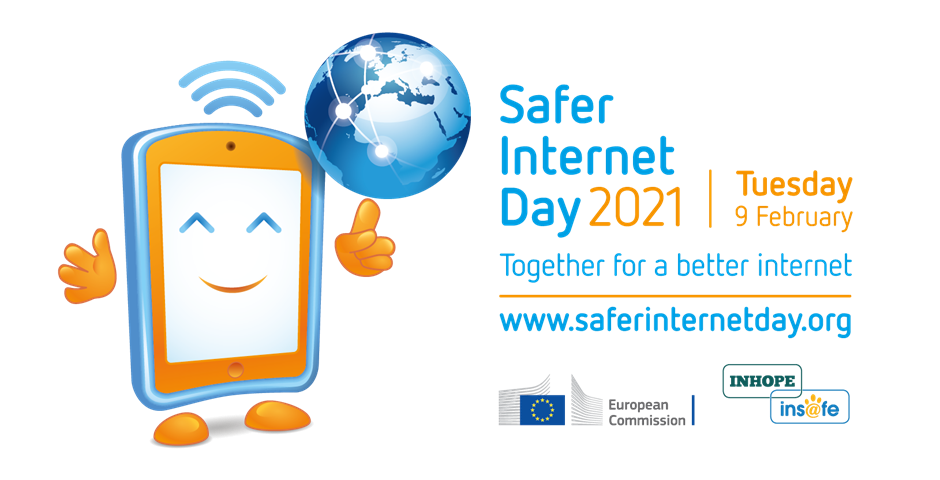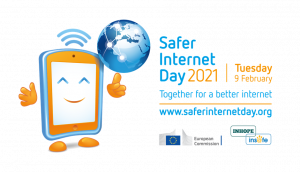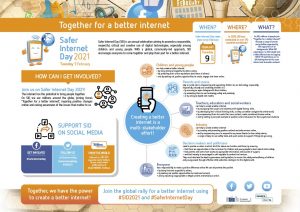Safer Internet Day 2021 on 9 February


On Tuesday, 9 February 2021, the 18th edition of Safer Internet Day is celebrated with actions taking place right across the globe. With a theme once again of “Together for a better internet”, the day calls upon all stakeholders to join together to make the internet a safer and better place for all, and especially for children and young people.
Every February since 2004, Safer Internet Day (SID) – organised by the Insafe/INHOPE network of European Safer Internet Centres (SICs) with the support of the European Commission* – has been a global, community-led observance which provides a space for all stakeholders to reflect on how together we can promote a responsible, respectful, critical and creative use of digital technologies with the ultimate goal of fostering a better internet for all.
Whether you are a young person, a parent or carer, a teacher or an educator, a policy maker, or whether you represent an organisation or industry, everyone has a role to play in creating and maintaining a better online world. Learn how to get involved at https://www.saferinternetday.org/join
With a global, community-led approach, Safer Internet Day encourages everyone to come together and play their part. There are many ways to do this:
- Children and young people can help to create a better internet by being kind and respectful to others online, by protecting their online reputations (and those of others), and by seeking out positive opportunities to create, engage and share online.
- Parents and carers play a crucial role in empowering and supporting children to use technology responsibly, respectfully, critically and creatively, whether it is by Safer Internet Day ensuring an open dialogue with their children, educating them to use technology safely and positively, or by acting as digital role models.
- Teachers, educators and social workers can help to create a better internet by equipping their pupils and students with digital literacy skills and by developing their critical thinking skills, which will allow them to better navigate the online world. They can empower them to create their own content, make considered choices online, and can set a personal example of positive online behaviour for their pupils and students.
- Industry can help to create a better internet by creating and promoting positive content and safe services online, and by empowering users to respond to any issues by providing clear safety advice, a range of easy-to-use safety tools, and quick access to support if things do go wrong.
- Decision makers and politicians need to provide a culture, in which all of the above can function and thrive – for example, by ensuring that there are opportunities in the curriculum for children and young people to learn about online safety, ensuring that parents and carers have access to appropriate information and sources of support, and that industry is encouraged to self-regulate its content and services. They must also take the lead in governance and legislation, and ultimately ensure the safety and wellbeing of children and young people through effective child protection strategies for the digital world.
- Everyone has a responsibility to make a positive difference online. We can all promote the positive by being kind and respectful to others and by seeking out positive opportunities to create and connect. We can all respond to the negative by reporting inappropriate or illegal content and behaviour online.
Find out more about Safer Internet Day at www.saferinternetday.org, including links to campaign activities in various countries, and stay up to date via the SID social media profiles on Twitter and Facebook
* Safer Internet Day would not be possible without the support of the European Commission. Currently the funding is provided by the Connecting Europe Facility programme (CEF). Find out more about the EC’s “European Strategy for a Better Internet for Children” on the European Commission’s website.

Source: www.saferinternetday.org


